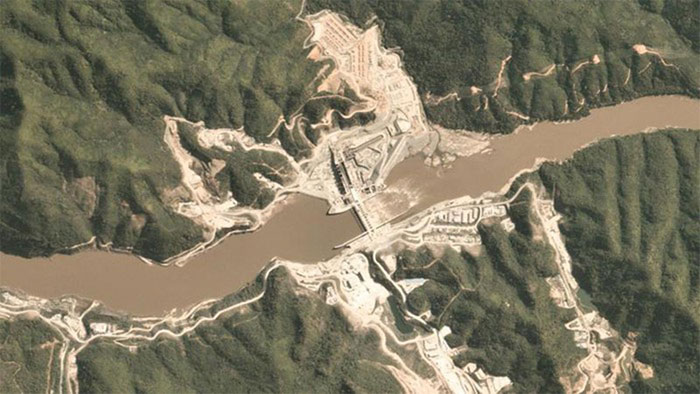The Mekong River hydroelectric dam causes Vietnam's GDP to fall by 0.3%
The research team at Hiroshima University, Japan, headed by economics professor Yoshida Yuichiro, has just published the latest research results in MDPI's scientific journal Sustainability on the impact of hydropower dams on the Mekong mainstream. for this area, especially downstream - Vietnam's Mekong Delta, March 19.
The results show that hydropower dams on the mainstream of the Mekong River will continue to cause severe damage to agriculture, hydropower, ecology, and the lives of people in the downstream areas including Vietnam and Cambodia. .
In the main basin of the Mekong River flowing through Vietnam, China, Laos, Thailand, Cambodia, and Myanmar, 46 of the 64 hydropower dams are built to produce 8,650 Megawatt (MW) of electricity. In addition, 11 hydropower dams are planned to build a total of 13,000 megawatts in the countries of the Mekong Delta.

Image taken from satellite Xayaburi hydroelectric dam on the Mekong.(Photo: Reuters)
Currently, the Mekong basin has a capacity of 30,000 MW, but only about 10% of this potential is developed. Although, the construction of a new hydroelectric dam in the Mekong basin is expected to generate about 15,000 MW of electricity, an increase of 8% of the region's demand by 2025 with a total revenue from hydropower production of 3.7 billion. USD / year. However, research shows that consequences such as reduced fish stocks, river inundation and loss of nutrients to agricultural land cause losses of up to US $ 500 million annually, with 54% of biodiversity likely to turn lost.
The total economic loss could cause Cambodia's GDP to drop by 3.7%, and Vietnam to 0.3%. Cambodia will suffer up to three-quarters of the fish caught, while Vietnam, Laos and Thailand will only suffer one-third.
According to the study, since most of the dams are planned to be built in Laos , the country will benefit most from electricity sales during the first 25 years, but biodiversity losses. , ecological sustainability and agricultural losses for Laos and the downstream area are much larger from electricity sales.
Professor Yoshida Yuichiro warned that the haste and carelessness in assessing the impact of power generation dams on the Mekong River will continue to cause great harm to social and economic life, especially for people living. by producing agriculture and fish in the lower Mekong region of Cambodia and Vietnam.
The study also concludes that upstream dams are one of the main drivers of drought and saltwater intrusion in the Mekong Delta of Vietnam , rather than the effects of climate change.
This is a selective and comprehensive research project of nearly 100 research works of many scholars around the world, published in leading scientific journals such as Science and PNAS.
- The Chinese hydroelectric dam causes the Earth to slow down
- The world's largest hydroelectric dam has many consequences
- No decision has been made on Lao hydroelectric dam
- Small dams threaten fish species on the Mekong River
- Smashing the Mekong River
- The US supported the postponement of the construction of the Lao hydroelectric dam
- Experts call on Laos to abandon the hydroelectric dam
- The dam will make the Mekong catfish extinct
- It is proposed to postpone the construction of a dam on the Mekong River
- New discovery of the process of forming the Mekong River
- Laos still built roads to Xayaburi project
- The Mekong River changes from alluvial to blue
- Hydroelectric dams change the flow, the 'water monster' Mekong is on the verge of extinction
- 'Conquering' the Da River to build Hoa Binh Hydroelectricity
 Norway built the world's tallest wooden tower
Norway built the world's tallest wooden tower Kremlin
Kremlin Ashurbanipal: The oldest royal library in the world
Ashurbanipal: The oldest royal library in the world Decoding the thousand-year construction of Qin Shihuang shocked the world
Decoding the thousand-year construction of Qin Shihuang shocked the world